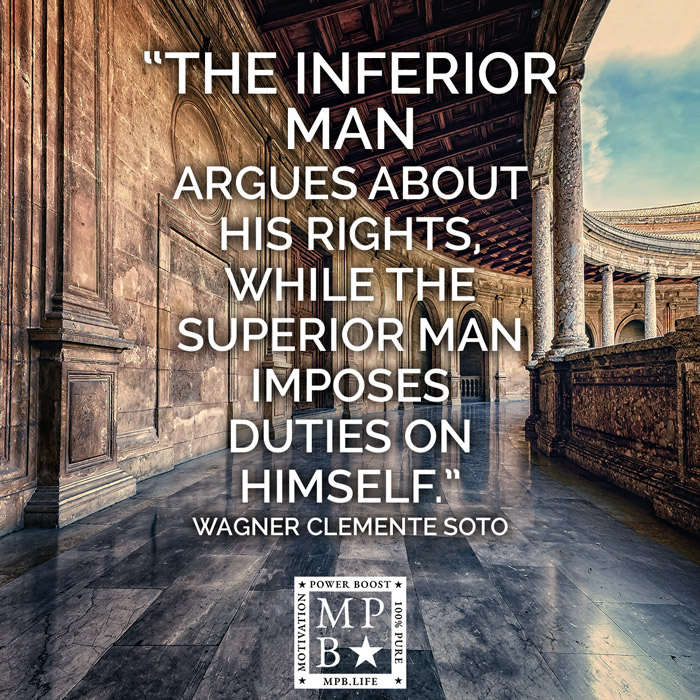
The Inferior Man Graphic © motivationpowerboost.com
“THE INFERIOR MAN
ARGUES ABOUT HIS RIGHTS,
WHILE THE SUPERIOR MAN
IMPOSES DUTIES ON HIMSELF.”
WAGNER CLEMENTE SOTO
The Path to Greatness: Embracing Duty Over Entitlement
Wagner Clemente Soto’s profound words, “The inferior man argues about his rights, while the superior man imposes duties on himself,” strike at the heart of what distinguishes those who achieve greatness from those who remain mired in mediocrity. This powerful quote serves as a clarion call for individuals seeking to unlock their full potential and make a lasting impact on the world.
At the core of Soto’s message lies a fundamental truth: true greatness is not achieved by demanding one’s rights or seeking personal gain, but rather by willingly shouldering responsibilities and obligations. The inferior man, consumed by a sense of entitlement, wastes precious energy arguing for what he believes he deserves. He fails to recognize that success and fulfillment are not bestowed upon us by virtue of our existence, but are earned through diligent effort and unwavering commitment.
In contrast, the superior man understands that the path to excellence is paved with self-imposed duties. He recognizes that greatness is not a destination, but a journey of continuous self-improvement and service to others. By holding himself accountable to higher standards and embracing the challenges that come with responsibility, the superior man cultivates the strength of character and resilience necessary to overcome obstacles and achieve his goals.
Soto’s words serve as a powerful reminder that true success is not measured by the accolades we receive or the material possessions we accumulate, but by the positive impact we have on the lives of others. The superior man understands that his actions have far-reaching consequences, and he strives to be a force for good in the world. He leads by example, inspiring others to rise above their own limitations and embrace a life of purpose and meaning.
In a society that often prioritizes individual rights over collective responsibilities, Soto’s message is more relevant than ever. By shifting our focus from what we are owed to what we can contribute, we can unlock the boundless potential within ourselves and create a better world for all. It is through the willingness to shoulder the burdens of duty that we find the strength to overcome adversity, the wisdom to navigate life’s challenges, and the fulfillment that comes from living a life of purpose.
So let us take Soto’s words to heart and embrace the path of the superior man. Let us set aside our ego-driven desires and instead focus on the duties we have to ourselves, our families, our communities, and the world at large. For it is only by imposing these duties upon ourselves that we can hope to achieve true greatness and leave a lasting legacy of positive change.
The Weight of Responsibility: Lessons from Stoic Philosophy
Soto’s emphasis on self-imposed duties resonates profoundly with the teachings of Stoic philosophy. The Stoics, renowned for their practical wisdom, understood that true freedom and contentment arise not from indulging in pleasure or avoiding discomfort, but from aligning one’s actions with reason and virtue.
In the Stoic worldview, every individual has a specific role to play in the grand scheme of the universe. This role is not determined by external circumstances or societal expectations, but rather by one’s inherent nature and capacity for rational thought. Embracing this role with diligence and integrity is the path to eudaimonia, a state of flourishing and well-being.
The Stoics recognized that life is replete with challenges and adversities beyond our control. However, they taught that while we cannot control external events, we can control our response to them. By willingly accepting the responsibilities and hardships that come our way, we cultivate the resilience and fortitude necessary to navigate life’s trials with grace and equanimity.
Marcus Aurelius, the Roman emperor and Stoic philosopher, encapsulated this idea in his famous Meditations: “The universe is change; our life is what our thoughts make it.” By choosing to embrace our duties with a clear and resolute mind, we transcend the petty distractions and fleeting desires that often derail us from our true purpose.
The Stoics understood that true greatness lies not in the pursuit of glory or acclaim, but in the steadfast commitment to living a virtuous life. They encouraged individuals to focus on cultivating qualities such as wisdom, justice, temperance, and courage – virtues that are not bestowed upon us, but must be actively practiced and refined through conscious effort.
Like Soto’s superior man, the Stoic sage recognized that the path to fulfillment is paved with self-imposed duties and responsibilities. By willingly shouldering these burdens, we develop the strength of character and moral fortitude necessary to navigate life’s challenges with grace and equanimity, ultimately contributing to the betterment of society as a whole.
Related Inspirational Quotes
“The great arises out of small things that are honored and cultivated.” – Zhuangzi
“Knowing others is wisdom, knowing yourself is Enlightenment.” – Lao Tzu
“It is better to conquer yourself than to win a thousand battles.” – Musonius Rufus
“It is not the man who has too little, but the man who craves more, that is poor.” – Seneca
“He is a wise man who does not grieve for the things which he has not, but rejoices for those which he has.” – Epictetus
